九年级英语知识整理Unit 4
九年级英语Unit 4知识归纳
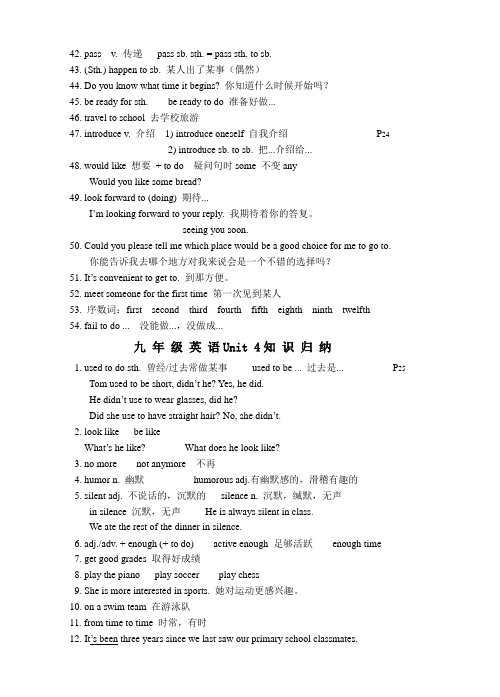
42. pass v. 传递pass sb. sth. = pass sth. to sb.43. (Sth.) happen to sb. 某人出了某事(偶然)44. Do you know what time it begins? 你知道什么时候开始吗?45. be ready for sth. be ready to do 准备好做...46. travel to school 去学校旅游47. introduce v. 介绍1) introduce oneself 自我介绍P242) introduce sb. to sb. 把...介绍给...48. would like 想要+ to do 疑问句时some 不变anyWould you like some bread?49. look forward to (doing) 期待...I’m looking forward to your reply. 我期待着你的答复。
seeing you soon.50. Could you please tell me which place would be a good choice for me to go to.你能告诉我去哪个地方对我来说会是一个不错的选择吗?51. It’s convenient to get to. 到那方便。
52. meet someone for the first time 第一次见到某人53. 序数词:first second third fourth fifth eighth ninth twelfth54. fail to do ... 没能做...,没做成...九年级英语Unit 4知识归纳1. used to do sth. 曾经/过去常做某事used to be ... 过去是... P25Tom used to be short, didn’t he? Yes, he did.He didn’t use to wear glasses, did he?Did she use to have straight hair? No, she didn’t.2. look like be likeWhat’s he like? What does he look like?3. no more not anymore 不再4. humor n. 幽默humorous adj.有幽默感的,滑稽有趣的5. silent adj. 不说话的,沉默的silence n. 沉默,缄默,无声in silence 沉默,无声He is always silent in class.We ate the rest of the dinner in silence.6. adj./adv. + enough (+ to do) active enough 足够活跃enough time7. get good grades 取得好成绩8. play the piano play soccer play chess9. She is more interested in sports. 她对运动更感兴趣。
初中英语人教新目标九年级全一册unit4知识点

九年级英语全一册Unit4知识点【重点单词】1.score n.分数;成绩;v.打分;得分2.interview v.采访;面试; n.访谈3.guard n.警卫;看守;v.守卫;保卫【重点短语】ed to do过去常常做2.deal with对付应付3.be proud of为……骄傲;感到自豪4.take pride in为……感到自豪5.from time to time 时常,有时6.in public公开地7.in person 亲身;亲自8.take up sth开始做;接受;占用9.not ...anymore 不再10.worry about为……担忧11.hang out闲逛12.think about考虑13.be alone独处14.on the soccer team在足球队15.no longer不再16.make a decision 做决定17.to one’s surprise令某人吃惊的是18.even though尽管19.pay attention to对……注意;留心20.in the last few years 在过去的几年里21.be afraid of 害怕22.turn red 变红23.tons of attention很多关注24.be careful当心25.give up放弃26.a very small number of...极少数的……27.give a speech作演讲28.all the time一直;总是29.be interested in 对......感兴趣30.change one’s life 改变某人的生活31.take care of照顾32.one of.........之一33.adj+ enough to do sth 足够…而能够做某事34.It’s hard to believe that ... 很难相信......35.It +has+been +一段时间+ since+从句自从……以来已经有多长时间了36.dare to do sth 敢于做某事37.It’s adj+ for sb+ to do sth对某人来说做某事……【重点句型】1.I used to be afraid of the dark.我过去常常害怕黑暗。
九年级上册英语第四单元
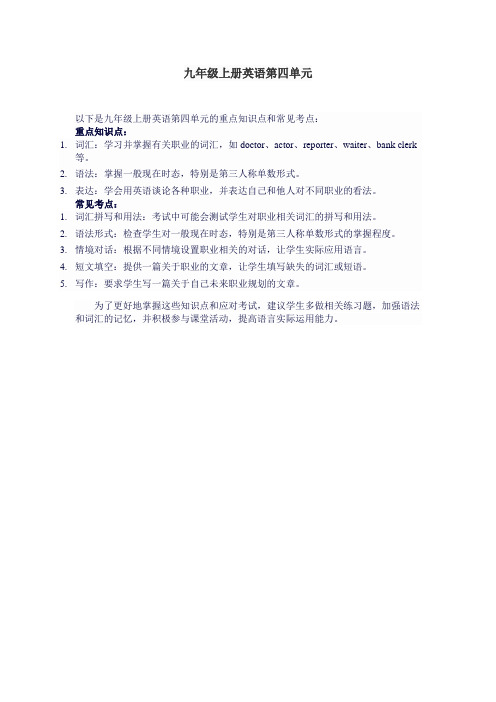
九年级上册英语第四单元
以下是九年级上册英语第四单元的重点知识点和常见考点:
重点知识点:
1.词汇:学习并掌握有关职业的词汇,如doctor、actor、reporter、waiter、bank clerk
等。
2.语法:掌握一般现在时态,特别是第三人称单数形式。
3.表达:学会用英语谈论各种职业,并表达自己和他人对不同职业的看法。
常见考点:
1.词汇拼写和用法:考试中可能会测试学生对职业相关词汇的拼写和用法。
2.语法形式:检查学生对一般现在时态,特别是第三人称单数形式的掌握程度。
3.情境对话:根据不同情境设置职业相关的对话,让学生实际应用语言。
4.短文填空:提供一篇关于职业的文章,让学生填写缺失的词汇或短语。
5.写作:要求学生写一篇关于自己未来职业规划的文章。
为了更好地掌握这些知识点和应对考试,建议学生多做相关练习题,加强语法和词汇的记忆,并积极参与课堂活动,提高语言实际运用能力。
英语九年级Unit 4重点短语和知识点梳理

英语九年级Unit 4重点短语和知识点梳理重点单词silent / 'saɪlənt/ adj. 不说话的;沉默的helpful / ˈhelpfl/ adj. 有用的;有帮助的score / skɔ:(r)/ n. & v. 得分;进球deal /di:l/ v.(dealt/delt/) 对付;对待shyness / 'ʃaɪnəs / n.含羞;腼腆dare / deə/ v. 敢于;胆敢crowd /kraʊd/ n.人群;观众ton /tʌn/ n.吨;(pl.)大量;许多private / 'praɪvət/ adj. 私人的;私密的require / rɪ'kwaɪə(r)/ v. 需要;要求British / ˈbrɪtɪʃ/ adj. 英国(人)的speech / spi:tʃ/ n. 讲话;发言ant / ænt/ n. 蚂蚁insect / ˈɪnsekt/ n. 昆虫seldom /'seldəm/ adv. 不常;很少influence /'ɪnflʊəns/ v. & n. 影响exactly /ɪgˈzæktli/ adv. 确切地;精确地absent /'æbsənt/ adj. 缺席;不在pride /praɪd/ n. 自豪;骄傲proud /praʊd/ adj. 自豪的;骄傲的introduction /ˌɪntrəˈdʌkʃn/ n. 介绍background / ˈbæk graʊnd/ n. 背景fail /feɪl/ v. 不及格;失败humorous / ˈhju:mərəs/ adj. 有幽默感的;滑稽有趣的interview / 'ɪntəvju:/ v. 采访;面试n. 面试;访谈public /'pʌblɪk/ n.民众adj.公开的;公众的guard /ɡɑ:(r)d/ n. 警卫;看守v. 守卫;保卫European / ˌjʊ(ə)rəˈpi:ən/ adj. 欧洲(人)African /ˈæfrɪkən/ adj.非洲(人)的n.非洲人Asian /ˈeɪʃn/ adj. 亚洲(人)的n. 亚洲人general /'dʒenrəl/ adj. 普遍的;常规的;总的n. 将军examination /ɪgˌzæmɪˈneɪʃn/ n. 考试;审查boarding /'bɔ:dɪŋ/ school 寄宿学校重点单词ed to do 过去常常做2. deal with 对付应付3. be proud of为……骄傲,感到自豪4. take pride in为……感到自豪5.from time to time 时常,有时6. in public 公开地7. in person 亲身,亲自8. take up sth.开始做,接受,占用9. worry about 为……担忧10. on the soccer team 在足球队11. hang out 闲逛12. think about 考虑13. make a decision 做决定14. to one’s surprise令某人吃惊的是15. even though 尽管16. tons of 很多17. a very small number of …极少数的…… 18. one of… ……之一19. be careful 当心重点知识点解析ev.& n. 使用,用途→ useful adj.有用的useless adj.无用的用法意思例句used to do sth .过去常常,过去曾经做某事I used to play basketball.(我过去常常打篮球。
最全面人教版九年级英语全册第四单元知识点归纳总结
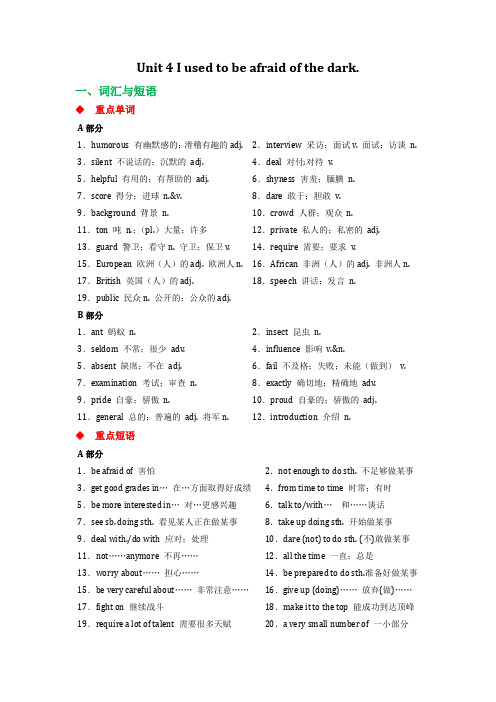
Unit 4 I used to be afraid of the dark.一、词汇与短语◆重点单词A部分1.humorous 有幽默感的;滑稽有趣的adj.2.interview 采访;面试v. 面试;访谈n. 3.silent 不说话的;沉默的adj.4.deal 对付;对待v.5.helpful 有用的;有帮助的adj.6.shyness 害羞;腼腆n.7.score 得分;进球n.&v.8.dare 敢于;胆敢v. 9.background 背景n.10.crowd 人群;观众n.11.ton 吨n.;(pl.)大量;许多12.private 私人的;私密的adj. 13.guard 警卫;看守n. 守卫;保卫v.14.require 需要;要求v. 15.European 欧洲(人)的adj. 欧洲人n.16.African 非洲(人)的adj. 非洲人n. 17.British 英国(人)的adj.18.speech 讲话;发言n.19.public 民众n. 公开的;公众的adj.B部分1.ant 蚂蚁n.2.insect 昆虫n.3.seldom 不常;很少adv.4.influence 影响v.&n.5.absent 缺席;不在adj.6.fail 不及格;失败;未能(做到)v. 7.examination 考试;审查n.8.exactly 确切地;精确地adv. 9.pride 自豪;骄傲n.10.proud 自豪的;骄傲的adj. 11.general 总的;普遍的adj. 将军n.12.introduction 介绍n.◆重点短语A部分1.be afraid of 害怕2.not enough to do sth. 不足够做某事3.get good grades in…在…方面取得好成绩4.from time to time 时常;有时5.be more interested in…对…更感兴趣6.talk to/with…和……谈话7.see sb. doing sth. 看见某人正在做某事8.take up doing sth. 开始做某事9.deal with./do with 应对;处理10.dare (not) to do sth. (不)敢做某事11.not……anymore 不再……12.all the time 一直;总是13.worry about……担心……14.be prepared to do sth.准备好做某事15.be very careful about……非常注意……16.give up (doing)……放弃(做)……17.fight on 继续战斗18.make it to the top 能成功到达顶峰19.require a lot of talent 需要很多天赋20.a very small number of 一小部分21.eat a lot of vegetables 吃大量的蔬菜22.listen to pop music 听流行音乐23.watch scary movies 看恐怖片24.at least 至少25.in public公开地;在别人(尤指生人)面前26.tons of许多的;大量27.give a speech 做演讲28.a number of许多;大量B部分1.make a decision做决定2.in person亲身;亲自3.even though即使;尽管4.take care of 照顾;照料5.be absent from 缺席;不在6.paint pictures 画画7.take pride in…为…感到自豪8.music classes 音乐课9.be proud of…为…骄傲;感到自豪10.on the soccer team 在足球队11.do well in……在……方面做得好12.work hard 学习努力13.make friends with sb. 和某人交朋友14.take care of/look after 照顾15.move to……搬到……16.feel lonely 感到孤独17.be absent from classes 旷课18.a boarding school 一所寄宿学校19.fail the exams/examinations 考试不及格20.advise sb. to do sth.建议某人做某事21.send…to…派……到……;送……到……22.look for 寻找23.have a great influence on sb. 对某人有很大影响◆重点句子A部分1.Mario, you used to be short, didn't you? 马里奥,你过去很矮,不是吗?2.It's been three years since we last saw our primary school classmates.我们上次见到小学同学已经三年了。
人教版九年级全一册英语Unit4单元语法知识点总结
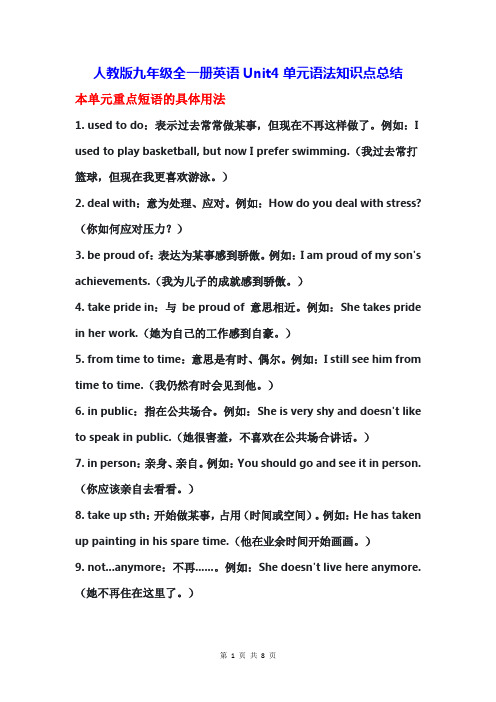
人教版九年级全一册英语Unit4单元语法知识点总结本单元重点短语的具体用法1. used to do:表示过去常常做某事,但现在不再这样做了。
例如:I used to play basketball, but now I prefer swimming.(我过去常打篮球,但现在我更喜欢游泳。
)2. deal with:意为处理、应对。
例如:How do you deal with stress?(你如何应对压力?)3. be proud of:表达为某事感到骄傲。
例如:I am proud of my son's achievements.(我为儿子的成就感到骄傲。
)4. take pride in:与be proud of 意思相近。
例如:She takes pride in her work.(她为自己的工作感到自豪。
)5. from time to time:意思是有时、偶尔。
例如:I still see him from time to time.(我仍然有时会见到他。
)6. in public:指在公共场合。
例如:She is very shy and doesn't like to speak in public.(她很害羞,不喜欢在公共场合讲话。
)7. in person:亲身、亲自。
例如:You should go and see it in person.(你应该亲自去看看。
)8. take up sth:开始做某事,占用(时间或空间)。
例如:He has taken up painting in his spare time.(他在业余时间开始画画。
)9. not...anymore:不再......。
例如:She doesn't live here anymore.(她不再住在这里了。
)10. worry about:担心、担忧。
例如:Don't worry about the exam, just do your best.(不要担心考试,尽力就好。
Unit4必背知识点 2021-2022学年人教版英语 九年级全册
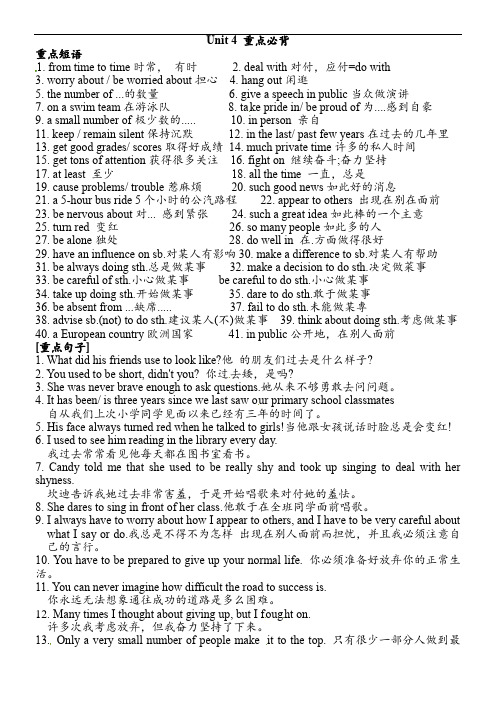
Unit 4 重点必背重点短语1. from time to time时常,有时2. deal with对付,应付=do with3. worry about / be worried about担心4. hang out闲逛5. the number of ...的数量6. give a speech in public当众做演讲7. on a swim team在游泳队8. take pride in/ be proud of为....感到自豪9. a small number of极少数的..... 10. in person 亲自11. keep / remain silent保持沉默12. in the last/ past few years在过去的几年里13. get good grades/ scores取得好成绩14. much private time许多的私人时间15. get tons of attention获得很多关注16. fight on 继续奋斗;奋力坚持17. at least 至少18. all the time 一直,总是19. cause problems/ trouble惹麻烦20. such good news如此好的消息21. a 5-hour bus ride 5个小时的公汽路程22. appear to others 出现在别在面前23. be nervous about对... 感到紧张24. such a great idea如此棒的一个主意25. turn red 变红26. so many people如此多的人27. be alone独处28. do well in 在.方面做得很好29. have an influence on sb.对某人有影响30. make a difference to sb.对某人有帮助31. be always doing sth.总是做某事32. make a decision to do sth.决定做菜事33. be careful of sth.小心做某事be careful to do sth.小心做某事34. take up doing sth.开始做某事35. dare to do sth.敢于做某事36. be absent from ...缺席..... 37. fail to do sth.未能做某專38. advise sb.(not) to do sth.建议某人(不)做某事39. think about doing sth.考虑做某事40. a European country欧洲国家41. in public公开地,在别人面前[重点句子]1. What did his friends use to look like?他的朋友们过去是什么样子?2. You used to be short, didn't you? 你过去矮,是吗?3. She was never brave enough to ask questions.她从来不够勇敢去问问题。
初中英语 人教版 九年级全一册 Unit 4 知识点
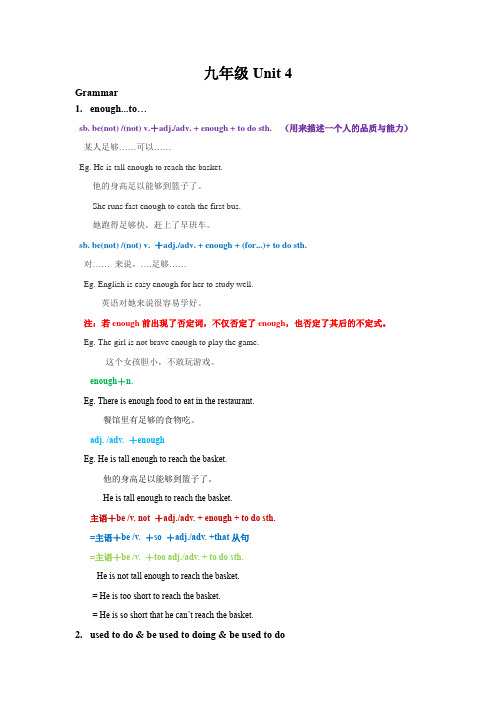
九年级Unit 4Grammar1.enough...to…sb. be(not) /(not) v.+adj./adv. + enough + to do sth. (用来描述一个人的品质与能力)某人足够……可以……Eg. He is tall enough to reach the basket.他的身高足以能够到篮子了。
She runs fast enough to catch the first bus.她跑得足够快,赶上了早班车。
sb. be(not) /(not) v. +adj./adv. + enough + (for...)+ to do sth.对…… 来说,….足够……Eg. English is easy enough for her to study well.英语对她来说很容易学好。
注:若enough前出现了否定词,不仅否定了enough,也否定了其后的不定式。
Eg. The girl is not brave enough to play the game.这个女孩胆小,不敢玩游戏。
enough+n.Eg. There is enough food to eat in the restaurant.餐馆里有足够的食物吃。
adj. /adv. +enoughEg. He is tall enough to reach the basket.他的身高足以能够到篮子了。
He is tall enough to reach the basket.主语+be /v. not +adj./adv.+ enough+ to do sth.=主语+be /v. +so +adj./adv.+that从句=主语+be /v. +too adj./adv.+ to do sth.He is not tall enough to reach the basket.= He is too short to reach the basket.= He is so short that he can’t reach the basket.ed to do & be used to doing & be used to doused to do sth. 过去常常做某事(现在不做了)主语适用于各种人称。
英语unit4九年级全一册笔记

英语unit4九年级全一册笔记一、介绍Unit 4是九年级全一册英语教材中的一个重要单元。
该单元主要涵盖了旅行和交通相关的词汇和语法,同时也包括了一些与旅行相关的文化知识和常用表达。
学习这个单元可以帮助学生提高他们关于旅行和交通的英语表达能力,同时也有助于丰富他们对不同文化的了解。
二、重点词汇1. journey (n.) 旅行2. destination (n.) 目的地3. sightseeing (n.) 观光4. transport (n.) 交通工具5. amodation (n.) 住宿6. reservation (n.) 预订7. departure (n.) 出发8. arrival (n.) 到达三、语法要点1. 现在进行时:表示现阶段正在发生的动作或状态。
e.g. We are taking a trip to Beijing next week.2. 一般过去时:表示过去某个时间内发生的动作或状态。
e.g. They visited the Great Wall last year.3. 情态动词can/could:表示能力、请求、许可等。
e.g. I can speak English fluently.四、典型句型1. How long have you been in Beijing?2. What are you going to do there?3. Would you mind taking the window seat?五、文化知识1. 我国的交通工具有地铁、高铁、公交车等,而外国也有地铁、火车、飞机等不同的交通工具。
2. 在一些西方国家,人们会习惯性地握手问候。
而在我国,人们会用双手合十作为问候的方式。
六、环节安排1. 学生阅读相关课文,理解基本内容和语法要点。
2. 学生进行对话练习,模拟旅行场景,增加语言运用能力。
3. 学生自主积累相关词汇,写作旅行计划或游记。
人教版英语九年级Unit4单元知识点归纳

人教版英语九年级Unit4单元知识点归纳Unit 4: I Used to Be Afraid of the DarkWhen I was younger。
I used to be afraid of the dark。
Iwould always worry about what was XXX were under my bed orin my closet。
I would always sleep with a XXX.Despite my fear of the dark。
I was on the swim team and loved being in the water。
I also enjoyed gym class and being active。
I was more interested in sports than in reading or watching TV.I hardly ever walked to school。
I would always take the bus。
even though my school was not far from my house。
I would chat with my friends on the bus ride to school.As I got older。
my fear of the dark slowly went away。
I realized that there was nothing to be afraid of and that the dark wasjust a natural part of life。
Now。
I can sleep without a nightlight and am not afraid of the dark anymore.Looking back。
I realize that my fear of the dark was just a phase that I went through。
人教版英语九年级Unit 4 重点知识归纳讲解

Unit 4 I used to be afraid of the dark. 知识清单Section A一、重要短语:1. 几天a couple of days2. 在课堂上保持沉默be silent in class3. 在游泳队on the swim team4. 过去很幽默used to be humorous5. 回答问题不够大胆be not brave enough to answer questions6. 对运动更感兴趣be more interested in sports7. 不时,有时from time to time8. 一些给年轻人的建议some advice to young people9. 在他考试中获得高分get good scores on his exam(s)10. 采访一个18岁的亚洲名星interview an 18-year-old Asian pop star11. 吸引无数目光get tons of attention12.有很多个人时间have much private time13. 我身边的警卫guards around me14. 放弃正常生活give up normal life15. 通向成功的路the road to success16. 害怕孤独be afraid of being alone17. 需要很多才能和艰苦的工作获得成功need a lot of talent and hard work to succeed18. 在大庭广众下演讲give a speech in public19. 读关于欧洲历史和非洲文化的书read books on European history and African culture20. 教我们英式英语teach us British English21. 到达成功的顶峰make it to the top二. 知识讲解Section A1. Mario used to be short. He used to wear glasses. 玛里奥过去个子矮。
Unit4笔记人教版英语九年级全册
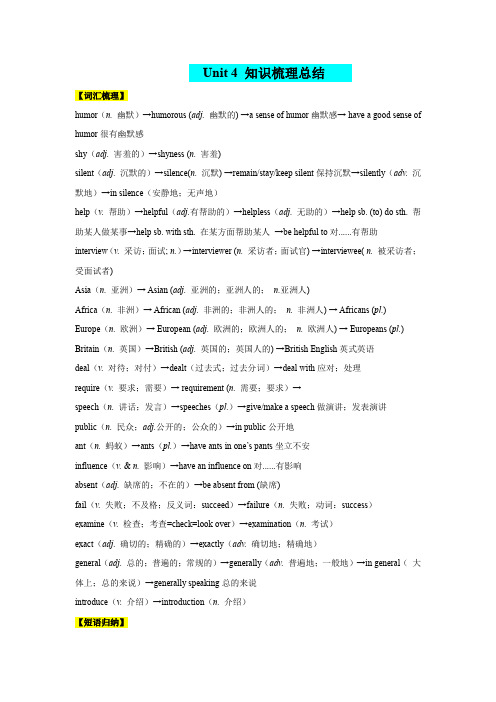
Unit 4 知识梳理总结【词汇梳理】humor(n.幽默)→humorous (adj. 幽默的) →a sense of humor幽默感→ have a good sense of humor很有幽默感shy(adj.害羞的)→shyness (n. 害羞)silent(adj.沉默的)→silence(n.沉默) →remain/stay/keep silent保持沉默→silently(adv.沉默地)→in silence(安静地;无声地)help(v.帮助)→helpful(adj.有帮助的)→helpless(adj.无助的)→help sb. (to) do sth. 帮助某人做某事→help sb. with sth. 在某方面帮助某人→be helpful to对......有帮助interview(v.采访;面试; n.)→interviewer (n.采访者;面试官) →interviewee( n.被采访者;受面试者)Asia(n.亚洲)→ Asian (adj. 亚洲的;亚洲人的;n.亚洲人)Africa(n.非洲)→ African (adj. 非洲的;非洲人的;n. 非洲人) → Africans (pl.)Europe(n.欧洲)→ European (adj. 欧洲的;欧洲人的;n. 欧洲人) → Europeans (pl.) Britain(n.英国)→British (adj. 英国的;英国人的) →British English英式英语deal(v.对待;对付)→dealt(过去式;过去分词)→deal with应对;处理require(v.要求;需要)→ requirement (n. 需要;要求)→speech(n.讲话;发言)→speeches(pl.)→give/make a speech做演讲;发表演讲public(n.民众;adj.公开的;公众的)→in public公开地ant(n.蚂蚁)→ants(pl.)→have ants in one’s pants坐立不安influence(v. & n. 影响)→have an influence on对......有影响absent(adj.缺席的;不在的)→be absent from (缺席)fail(v.失败;不及格;反义词:succeed)→failure(n.失败;动词:success)examine(v.检查;考查=check=look over)→examination(n.考试)exact(adj.确切的;精确的)→exactly(adv.确切地;精确地)general(adj.总的;普遍的;常规的)→generally(adv.普遍地;一般地)→in general(大体上;总的来说)→generally speaking总的来说introduce(v.介绍)→introduction(n.介绍)【短语归纳】be helpful to sb. 对某人有帮助get good scores/grades取得好成绩used to do sth.过去常常做某事from time to time=at times=sometimes时常;有时be interested in=have/show (an) interest in... 对......感兴趣dare to do 敢于做某事tons of很多;极多private school 私立学校public school 公立学校boarding school寄宿学校require sb.to do sth.要求某人作某事take up开始从事;占用(时间;空间)hang out闲逛give up/give it/them up 放弃/放弃它(们)give/make a speech做演讲;发表演讲in public公开地be nervous about...对......感到紧张all the time一直;总是have an influence on... 对......有影响be absent from... 缺席fail to do sth. 未能做某事in person亲身;亲自take an examination/pass the examination/fail the examination 参加考试/通过考试/考试不及格take pride in=be proud of 为......骄傲;感到自豪take care of=look after照顾look for jobs寻找工作generally speaking总的来说in general大体上;总的来说in the last few years 在过去的几年里(常用于现在完成时态)【考点总结】Section A1.This party is such a great idea!such非常,(强调程度)这样such+a/an+adj.+单数名词such+adj.+复数名词/不可数名词e.g. She is such a beautiful woman. =She is so beautiful a woman.I am surprised she made such great progress.2.It’s been three years since we last saw our primary school classmates.since conj.& prep.从......以后;自......以来;conj.因为;既然①作连词,意为“自......以后;自......以来”,连接时间状语从句,从句常用一般过去时;主句用完成时。
人教版九年级英语Unit4重点知识归纳

Unit4 I used to be afraid of the dark重点知识归纳一、词汇应用1.be silent in class在课堂上保持沉默2.be interested in ... 对……感兴趣3.on a basketball team 在篮球队4.from time to time 时常;有时5.turn red 变红6.get good scores on the exams 在考试中取得好成绩7.wear glasses 戴眼镜8.take up singing 开始唱歌9.deal with her shyness 克服她的羞怯10.not ... anymore 不再……11.in front of crowds 在众人面前12.all the time 频繁;反复13.get tons of attention 被众人所关注;吸引无数目光14.worry about ... / be worried about ... 担心……;担忧……15.be careful about ... 对……小心16.give up your normal life 放弃你正常的生活17.the road to success 成功之路18.fight on 奋力坚持下去;继续战斗19.require a lot of talent and hard work 需要很大的天赋和勤奋20.make it to the top 成功21.give a speech 发表演讲22.in public 公开地;在别人面前23.be nervous about tests 考试紧张24.do well in school 在学校表现好25.cause problems 制造麻烦26.take care of sb. 照顾某人27.influence his schoolwork 影响他的学业28.be absent from classes 缺课;缺勤29.fail his examinations 他考试不及格30.in person 亲身;亲自31.even though 即使;虽然32.think of sb. 想起某人33.become active in many other activities在许多别的活动中变得积极34.send sb. to a boarding school 将某人送到一所寄宿学校35.dare to do sth. 敢做某事36.make the decision to do sth. 决定做某事37.advise sb. to do sth. 建议某人做某事二、重点句型1.I used to be afraid of the dark.我过去常常前害怕黑暗.2.I go to sleep with my bedroom light on.我开着卧室的灯睡觉.3.I used to spend a lot of time playing games with my friends.以前我常常花很多时间和我的朋友们玩游戏.4.I hardly ever have time for concerts.我几乎没有时间去听音乐会.5.My life has changed a lot in the last few years.我的生活在过去几年里改变了很多.6.It will make you stressed out.那会使你紧张的.7.It seems that Yu Mei has changed a lot.玉梅似乎变化很大.三、词汇讲解1. silentsilent是形容词,意为“沉默的;无言的”,其名词形式为silence。
[荐]人教版九年级英语上Unit4单词、知识梳理、词汇句式精讲
![[荐]人教版九年级英语上Unit4单词、知识梳理、词汇句式精讲](https://img.taocdn.com/s3/m/a68d8ae0a8956bec0875e312.png)
人教版九年级英语上Unit4单词、知识梳理、词汇句式精讲一、Unit4 单词humorous [ˈhjuːmərəs] 有幽默感的;滑稽有趣的silent [ˈsaɪlənt] 不说话的;沉默的helpful ['helpfəl] 有用的;有帮助的from time to time [frɒm//taɪm//tuː//taɪm] 时常;有时score [skɔː] 得分;打分background [ˈbækɡraʊnd] 背景interview [ˈɪntəvjuː] 采访;面试n.Asian [ˈeɪʃ(ə)nˌˈeɪʒ(ə)n] 亚洲的;亚洲人的,亚洲人deal with 对付;应付dare [deə] 敢于;胆敢private [ˈpraɪvɪt] 私人的;私密的guard [ɡɑːd] 警卫;看守v.守卫;保卫require [rɪˈkwaɪə] 需要;要求European [jʊərəˈpiːən] 欧洲的;欧洲人的British ['brɪtɪʃ] 英国的;英国人的speech [spiːtʃ] 讲话;发言ant [ænt] 蚂蚁insect [ˈɪnsekt] 昆虫influence [ˈɪnflʊəns] 影响seldom [ˈseldəm] 不常;很少proud [praʊd] 自豪的;骄傲的be proud of 为⋯⋯骄傲;感到自豪absent [ˈæbsənt] 缺席;不在fail [feɪl] 失败;未能(做到)examination [ɪgˌzæmɪ'neɪʃən] 考试;审查boarding school 寄宿学校in person 亲身;亲自exactly [ɪg'zæktli] 确切地;精确地pride [praɪd] 自豪;骄傲take pride in 为⋯⋯感到自豪grandson [ˈɡrændsʌn] 孙子;外孙general [ˈdʒenər(ə)l] 普遍的;常规的;总的将军introduction [ɪntrəˈdʌkʃ(ə)n] 介绍Paula 葆拉(女名)Alfred 艾尔弗雷德(男名)Billy 比利(男名)Candy 坎迪(女名)Jerry 杰里(男名);杰丽(女名)Emily 埃米莉(女名)二、Unit4 知识梳理Unit4 I used to be afraid of the dark.【重点短语】ed to do 过去常常做2.deal with 对付应付3.be proud of 为……骄傲,感到自豪4.take pride in 为……感到自豪5.from time to time 时常,有时6.in public 公开地7.in person 亲身,亲自8.take up sth 开始做,接受,占用9.not……anymore 不再10.worry about 为……担忧11.hang out 闲逛12.think about 考虑13.be alone 独处14.on the soccer team 在足球队15.no longer 不再16.make a decision 做决定17.to one’s surprise 令某人吃惊的是18.even though 尽管19.pay attention to 对……注意,留心20.in the last few years 在过去的几年里21.be afraid of 害怕22.turn red 变红23.tons of attention 很多关注24.be careful 当心25.give up 放弃26.a very small number of …极少数的……27.give a speech 作演讲28.all the time 一直总是29.be interested in 对……感兴趣30.change one’s life 改变某人的生活31.take care of 照顾32.one of…, ……之一【重点句型】1. I used to be afraid of the dark.我过去常常前害怕黑暗.2.I go to sleep with my bedroom light on.我开着卧室的灯睡觉.3. I used to spend a lot of time playing games with my friends.以前我常常花很多时间和我的朋友们玩游戏.4. I hardly ever have time for concerts.我几乎没有时间去听音乐会.5. My life has changed a lot in the last few years.我的生活在过去几年里改变了很多.6. It will make you stressed out.那会使你紧张的.7. It seems that Yu Mei has changed a lot.玉梅似乎变化很大.三、词汇精讲1. silentsilent是形容词,意为“沉默的;无言的”,其名词形式为silence。
人教版丨九年级英语4单元必记知识点

人教版丨九年级英语4单元必记知识点Unit4 I used to be afraid of the dark.【重点短语】1. be more interested in 对…更感兴趣2. on the swim team 游泳队的队员3. be terrified of 害怕4. gym class 体操课5. worry about 担心6. all the time 一直,总是7. chat with 与…闲聊8. hardly ever 几乎从不9. walk to school = go to school on foot 步行去上学take the bus to school = go to school by bus 乘车去上学10. as well as 不仅…而且...【考点详解】1. used to do sth. 过去常常做某事(这个知识点考的很多,大家要注意这个短语的意思,还要记着used后面用的是不定式to do)如:He used to play football after school.放学后他过去常常踢足球。
2. play the piano 弹钢琴(play后面如果跟西洋乐器,大家记住,中间要加the,如果是中国乐器,不加the,如:play erhu)3. ①be interested in sth. 对…感兴趣②be interested in doing sth. 对做…感兴趣(对于这两个用法大家一定要掌握,切记切记)如:He is interested in math, but he isn't interested in speaking English. 他对数学感兴趣,但是他对说英语不感兴趣。
4. interested adj. 感兴趣的,指人对某事物感兴趣,往往主语是人interesting adj.有趣的,指某事物/某人具有趣味,主语往往是物(对于interested和interesting要区分清楚,一个主语往往是人,一个主语往往是物)5. be terrified of sth. 害怕……如:I am terrified of the dog.be terrified of doing sth. 害怕做……如:I am terrified of speaking.6. spend 动词,表示“花费金钱、时间”(spend和pay for它们的主语都是人,这一点大家要清楚)①spend…on sth. 在某事上花费(金钱、时间)(重要考点)②spend…(in)doing sth. 花费(金钱、时间)去做某事(重要考点,尤其要注意动名词,也就是动词的ing形式)如:He spends too much time on clothes. 他花费太多的时间在衣着上。
九年级英语unit4知识点总结
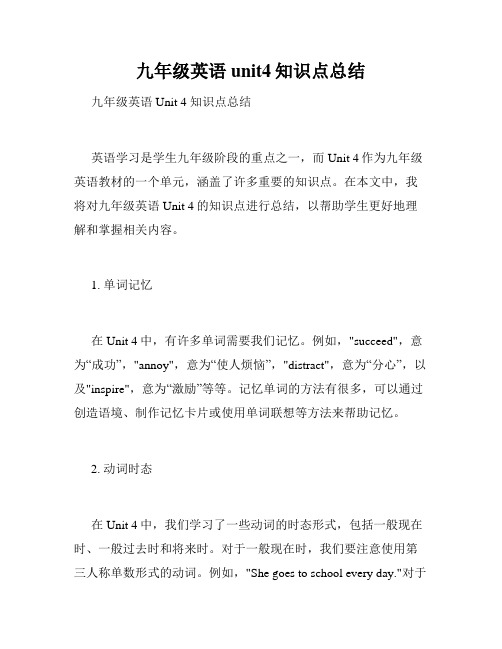
九年级英语unit4知识点总结九年级英语Unit 4 知识点总结英语学习是学生九年级阶段的重点之一,而Unit 4作为九年级英语教材的一个单元,涵盖了许多重要的知识点。
在本文中,我将对九年级英语Unit 4的知识点进行总结,以帮助学生更好地理解和掌握相关内容。
1. 单词记忆在Unit 4中,有许多单词需要我们记忆。
例如,"succeed",意为“成功”,"annoy",意为“使人烦恼”,"distract",意为“分心”,以及"inspire",意为“激励”等等。
记忆单词的方法有很多,可以通过创造语境、制作记忆卡片或使用单词联想等方法来帮助记忆。
2. 动词时态在Unit 4中,我们学习了一些动词的时态形式,包括一般现在时、一般过去时和将来时。
对于一般现在时,我们要注意使用第三人称单数形式的动词。
例如,"She goes to school every day."对于一般过去时,我们需要将动词的过去式形式加在句子中。
例如,"She went to school yesterday."而将来时则需要使用助动词"will",并在动词原形后加上动词。
例如,"I will go to school tomorrow."3. 冠词的使用在英语中,冠词的使用是一项比较困难的语法知识。
在Unit 4中,我们也涉及了冠词的使用。
冠词分为不定冠词"a"和"an",以及定冠词"the"。
不定冠词用于泛指,而定冠词用于特指。
例如,"I saw a cat in the garden."中的"a"是不定冠词,而"the"用于特指,如:"I saw the cat in the garden."4. 句型的运用在Unit 4中,我们学习了一些常用的句型,如祈使句、感叹句和疑问句等。
人教英语九年级Unit 4 知识点归纳
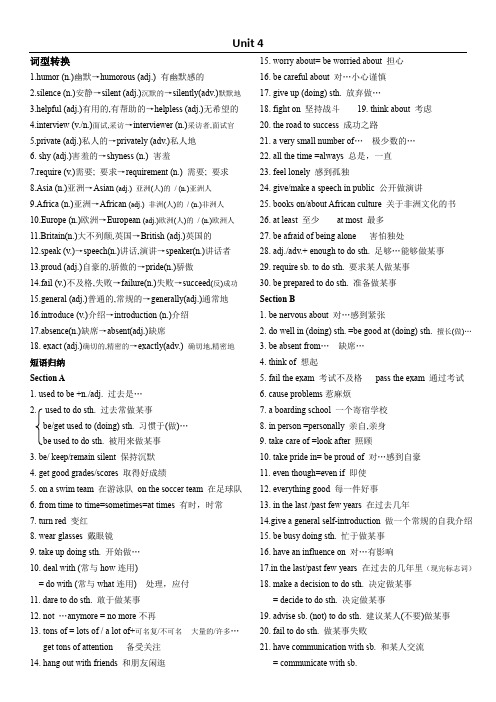
词型转换1.humor (n.)幽默→humorous (adj.) 有幽默感的2.silence (n.)安静→silent (adj.)沉默的→silently(adv.)默默地3.helpful (adj.)有用的,有帮助的→helpless (adj.)无希望的4.interview (v./n.)面试,采访→interviewer (n.)采访者,面试官5.private (adj.)私人的→privately (adv.)私人地6. shy (adj.)害羞的→shyness (n.) 害羞7.require (v.)需要; 要求→requirement (n.) 需要; 要求 (n.)亚洲→Asian (adj.) 亚洲(人)的/ (n.)亚洲人9.Africa (n.)亚洲→African (adj.) 非洲(人)的/ (n.)非洲人10.Europe (n.)欧洲→European (adj.)欧洲(人)的/ (n.)欧洲人11.Britain(n.)大不列颠,英国→British (adj.)英国的12.speak (v.)→speech(n.)讲话,演讲→speaker(n.)讲话者13.proud (adj.)自豪的,骄傲的→pride(n.)骄傲14.fail (v.)不及格,失败→failure(n.)失败→succeed(反)成功15.general (adj.)普通的,常规的→generally(adj.)通常地16.introduce (v.)介绍→introduction (n.)介绍17.absence(n.)缺席→absent(adj.)缺席18. exact (adj.)确切的,精密的→exactly(adv.) 确切地,精密地短语归纳Section A1. used to be +n./adj. 过去是…2. used to do sth. 过去常做某事be/get used to (doing) sth. 习惯于(做)…be used to do sth. 被用来做某事3. be/ keep/remain silent 保持沉默4. get good grades/scores 取得好成绩5. on a swim team 在游泳队on the soccer team 在足球队6. from time to time=sometimes=at times 有时,时常7. turn red 变红8. wear glasses 戴眼镜9. take up doing sth. 开始做…10. deal with (常与how连用)= do with (常与what连用) 处理,应付11. dare to do sth. 敢于做某事12. not …anymore = no more不再13. tons of = lots of / a lot of+可名复/不可名大量的/许多…get tons of attention 备受关注14. hang out with friends 和朋友闲逛15. worry about= be worried about 担心16. be careful about 对…小心谨慎17. give up (doing) sth. 放弃做…18. fight on 坚持战斗19. think about 考虑20. the road to success 成功之路21. a very small number of…极少数的…22. all the time =always 总是,一直23. feel lonely 感到孤独24. give/make a speech in public 公开做演讲25. books on/about African culture 关于非洲文化的书26. at least 至少at most 最多27. be afraid of being alone 害怕独处28. adj./adv.+ enough to do sth. 足够…能够做某事29. require sb. to do sth. 要求某人做某事30. be prepared to do sth. 准备做某事Section B1. be nervous about 对…感到紧张2. do well in (doing) sth. =be good at (doing) sth. 擅长(做)…3. be absent from…缺席…4. think of 想起5. fail the exam 考试不及格pass the exam 通过考试6. cause problems惹麻烦7. a boarding school 一个寄宿学校8. in person =personally 亲自,亲身9. take care of =look after 照顾10. take pride in= be proud of 对…感到自豪11. even though=even if 即使12. everything good 每一件好事13. in the last /past few years 在过去几年14.give a general self-introduction 做一个常规的自我介绍15. be busy doing sth. 忙于做某事16. have an influence on 对…有影响17.in the last/past few years 在过去的几年里(现完标志词)18. make a decision to do sth. 决定做某事= decide to do sth. 决定做某事19. advise sb. (not) to do sth. 建议某人(不要)做某事20. fail to do sth. 做某事失败21. have communication with sb. 和某人交流= communicate with sb.知识点总结1. sb. used to do sth. 某人过去常做…(现在不做了)sb. used to be a/an … 某人过去是一名… sb. used to be+adj.… 某人过去…There used to be … (某时/某地)过去有… 肯定句: They used to play together. 否定句:①They didn ’t use to play together. ②They usedn’t to play together. 一般疑问句:①Did they use to play together ? ②Used they to play together? 反义疑问句:①They used to play together, did n ’t they? ②They used to play together, used n ’t they? 【辨析】 used to do sth. 过去常常做某事 use …to do sth. 用…做… be used to do sth. 被用来做…get/be used to (doing) sth. 习惯于(做)某事 2. What’s sb. like? (问外貌+性格) What does sb. look like? (只问外貌) 3. such + 名词短语 如此…的… so + 形/副 这(那)么地…【注意】①such +a / an+形容词+可单= so+形容词+a / an +可单 ②当名词前有many, much, few 或little 等修饰时,用so 而不用such 4. dare to do sth. 敢于做某事(常用在肯定句里)实义动词 dare do sth. (常用在否定句或条件状语从句)情态动词 5. It ’s (It has) been+时间段+ since 从句 (从句用一般过去时) 自从…以来有多长时间了 6. take up (doing) sth. 开始(做)… (某种爱好)take up sth. 占据(时间/空间) 【拓展】take 词组take off 起飞;脱下;动身 take down 记下;取下 take place 发生;举行 take a look 看一下 take a walk 散步 take away 带走,拿走,取走 take care of 照顾;照料 take charge 掌管,负责 7. have difficulties (in) doing sth. 在做某事方面有困难 (difficulties 可用difficulty / trouble / problems 替换) 8. require sth. 需要,依靠…require sb. to do sth. 要求某人做某事 require doing sth. 需要被… (主动表被动)require that 从句 (从句谓语动:should +动原,should 可省)e.g. My bike requires repairing.9. seldom 不常;很少 (频度副词) (否定词, 位于实前be 后) 常见的否定词还有 hardly (ever), never, few, little 等 e.g. She sel dom goes out after ten o’clock , does he ? 10. fail the exam = fail in the exam 考试不及格 fail in (doing) sth. 在某一方面失败/做某事失败 fail to do sth. 未能做某事 11. be proud of +名/代/Ving= take pride in +名/代/Ving 为…骄傲/自豪 the pride of … …的骄傲e.g. We are proud of Lucy. = We take pride in Lucy. Lucy is the pride of us. 露西是我们的骄傲。
人教版英语九年级全一册第四单元知识点整理
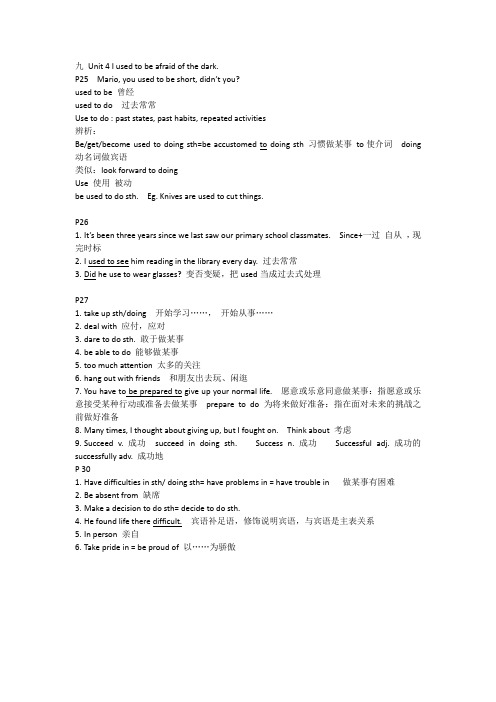
九Unit 4 I used to be afraid of the dark.P25 Mario, you used to be short, didn’t you?used to be 曾经used to do 过去常常Use to do : past states, past habits, repeated activities辨析:Be/get/become used to doing sth=be accustomed to doing sth 习惯做某事to使介词doing 动名词做宾语类似:look forward to doingUse 使用被动be used to do sth. Eg. Knives are used to cut things.P261.It’s been three years since we last saw our primary school classmates. Since+一过自从,现完时标2.I used to see him reading in the library every day. 过去常常3.Did he use to wear glasses? 变否变疑,把used当成过去式处理P271.take up sth/doing 开始学习……,开始从事……2.deal with 应付,应对3.dare to do sth. 敢于做某事4.be able to do 能够做某事5.too much attention 太多的关注6.hang out with friends 和朋友出去玩、闲逛7.You have to be prepared to give up your normal life. 愿意或乐意同意做某事:指愿意或乐意接受某种行动或准备去做某事prepare to do 为将来做好准备:指在面对未来的挑战之前做好准备8.Many times, I thought about giving up, but I fought on. Think about 考虑9.Succeed v. 成功succeed in doing sth. Success n. 成功Successful adj. 成功的successfully adv. 成功地P 301.Have difficulties in sth/ doing sth= have problems in = have trouble in 做某事有困难2.Be absent from 缺席3.Make a decision to do sth= decide to do sth.4.He found life there difficult. 宾语补足语,修饰说明宾语,与宾语是主表关系5.In person 亲自6.Take pride in = be proud of 以……为骄傲。
- 1、下载文档前请自行甄别文档内容的完整性,平台不提供额外的编辑、内容补充、找答案等附加服务。
- 2、"仅部分预览"的文档,不可在线预览部分如存在完整性等问题,可反馈申请退款(可完整预览的文档不适用该条件!)。
- 3、如文档侵犯您的权益,请联系客服反馈,我们会尽快为您处理(人工客服工作时间:9:00-18:30)。
九年级英语知识整理Unit 4虚拟语气及用法1. 语气(mood) 就是我们常说的说话人说话的口气。
在汉语中,语气是由说话人说话的语调、情节等等表现出来的,动词没有任何变化。
而在英语中,除了语调之外,最主要的是动词发生变化而表示不同的语气。
在英语中语气分为三类:陈述语气、祈使语气、虚拟语气。
2. 虚拟语气:如果我们所说的不是事实,也不是要求、命令、劝告等,而只是一种假设、愿望、建议或是一种实现不了的空想就用虚拟语气。
3. 虚拟语气常用在条件句及其他一些从句中。
注意:条件句分两种,真实条件句和虚拟条件句。
只有在虚拟(非真实)条件句中,才用虚拟语气,而在真实条件句中,要用陈述语气。
请比较:(1)If it is sunny tomorrow , we’ll go to the zoo. 如果明天天气好,我们将会去公园。
在这句话中,明天天气好是完全有可能实现的,并非虚拟、幻想,因此是真实条件句。
在本句中,适用“主将从现(即主句用将来时,从句用现在时)。
”(2)If I were you , I would go at once. 如果我是你的话,我立刻就走。
在这句话中,条件句,“如果我是你”,但事实上,我不可能成为你,这只是假设的情况,没有实现的可能。
当条件实现的可能性很小或者没有时,就需要用虚拟语气来表示,动词发生了变化。
4. 在虚拟语气中,句子动词的时态比真实条件句中的时态后退一步。
英语虚拟语气的形式有下列几种:If I were you, I would give up drinking immediately.If I were to see her tomorrow, I would tell her the truth.If you went there next time, you would see what I mean.在这一单元中,我们初步接触虚拟语气的用法及结构,只学习表示与现在事实相反的情况下如何体现虚拟语气。
注意事项:如果条件句中省略了连词if,从句须到装。
Were she a man, she would run for (竞选)president.5. 虚拟语气的疑问式,除了动词相应的变化外,其他变化与陈述语气相同。
如:(1)What would you do if you were in the lion’s cage ? 如果你在狮子笼里,你会怎么做?If I were in the lion’s cage, I’d call for help. 如果我在狮子笼里,我会大呼救命。
Or If I were in the lion’s cage, I’d get out fast. 如果我在狮子笼里,我会迅速出来。
(2)What would you do if you won the lottery? 如果你赢了抽奖,你会做什么?I’d give it to medical research. 我会用于医学研究。
Or I’d put it in the bank. 我会存到银行。
虚拟语气练习( ) 1. If my father ______ here now, he ______ tell me what to do.A. were, wouldB. were, willC. is, will( ) 2. He ____ learn quickly if he ____ harder.A. would, workedB. will, worksC. will, will work( ) 3. If I ___much money, I ___buy a big house.A. were, wouldB. had, willC. had, would( ) 4. I _____ talk that way if I were peter.A. didn'tB. wouldn’tC. won’t( ) 5. If I _________ you, I’d wear a shirt and tie.A. wereB. wasC. areD. is( ) 6. What_________ you do if you won a million dollars?A. willB. wouldC. shallD. should( ) 7. If I were a bird, I _________ fly freely in the sky.A. willB. wouldC. would haveD. were going to( ) 8. If he __ ___ here, that’s very good.A. isB. wasC. wereD. has been( ) 9.I don’t know if it _______tomorrow .If it _______,I will stay at home .A) will rain ,rains B) ranis , will rain C) will rain , will rain D) rain , rains( ) 10. If I ______you ,I_____the present .A) Were ,would refuse B) are ,will refuse C) were ,will refuse D) was ,shall refuse二、根据不同情境,首先判断这个情景是真实可能发生的,还是虚拟的,然后填空。
Situation A1. EXAMPLE: John is a doctor, but if he __were_ (be)a truck driver, he _would have _(have)very different skills. (John不可能是个卡车司机,因此这个情境是虚拟的。
)2. John’s wife is a doctor , too , but she is planning to change her career. If she _______ (change)her career, she _________ (study)to become a lawyer.Situation B3. Branny is Brazilian, but she has lived in the United States and New Zealand, so she speaks excellent English. If she _________ (stay)in Brazil, her English _________ (not)(be)so good.4. However, Branny _______ (speak)French too if she _________ (move)to France next year.Situation C5. Mary’s car is old. If it ________(break down), she _________ (buy)a new one.6. Because Mary has a car, she has driven to school every day this term. But if she _______ (not)(have)a car, she ________ (take)the bus.Situation D7. Marcia has applied to graduate school. She _______ (start)school next fall if she ______(get)accepted.8. When Marcia was twenty-one, she quit school for several years to get married and raise a family. If she ______(continue)her studies instead of raising a family, she ________(begin)graduated from school a long time ago.★虚拟语气的其他用法He suggested that they (should ) stop smoking.上述动词的名词形式出现时,that 引导的从句仍用虚拟语气。
I wish I had never stopped teaching. (=I am sorry I stopped teaching.)I wish they’d let us get some sleep.注意:wish与hope接宾语从句的区别在于:hope表示一般可以实现的希望,宾语从句用陈述语气。
wish 表示很难或不大可能实现的希望,宾语从句用虚拟语气。
试比较:(1)We hope they will come,(We don’t know if they can come.)(2)We wish they could come,(We know they are not coming.)3、It’s (high) time that…+动词过去式或should+动词原形,如:It’s time (that) you had a hair cut.It’s high time (that) we took some action.幸福达标:(1). If I you, I would go by plane. Flying is much faster. A. be B. was C. were D. am(2). I do not think those people are really English. If they were, they speak with French accents.A. don'tB. will notC. mustn'tD. wouldn't(3). If Jone tomorrow, what would you do?A. were not to comeB. will not comeC. would not comeD. had not come(4). If they had known him, to him?A. would they have talkedB. would they talkC.had they talkedD. they would talk(5. I would have gone to the concert, if I time.A. had hadB. have hadC. hadD. would have had(6). “Who should go to see Li Ying? He is ill today.” “I suggest Wang Hong.”A. goesB. would goC. goD. went(7). The housemaster was strict. He requested that we television on week nights.A. not watchB. must not to watchC. not be watchingD. have not watch(8). I can't speak Japanese, but I do wish I . A. can B. could C. had D. speak(9). “Are you enjoying your stay here?’“Yes, very much. I wish I have to leave so soon.”A. won'tB. don'tC. mustn'tD. didn't(10). “What will you do during the summer holidays?”“I don't know, but it's about time on something.”A. I'm decidingB. I'll decideC. I decidedD. I'd decided(11). I wish you interrupt when I'm talking on the phone.A. will notB. would notC. do notD. did not(12). I didn't go to the football match, but I do wish I there.A. wentB. wasC. wereD.had been(13). It is high time we drug trafficking.(贩毒)A. did away withB. do away withC. did awayD. should do away with课文重难点:1.what if的用法:(1)如果……怎么办?e.g. What if I don’t know anyone? 如果我不认识任何人怎么办?(2)即使……又有什么关系?e.g. What if he goes angry? 即使他生气又有什么关系?2.—What are you like? 你是个什么样的人?—I think I’m creative and outgoing. 我想我具备创造力并且善于交际。
